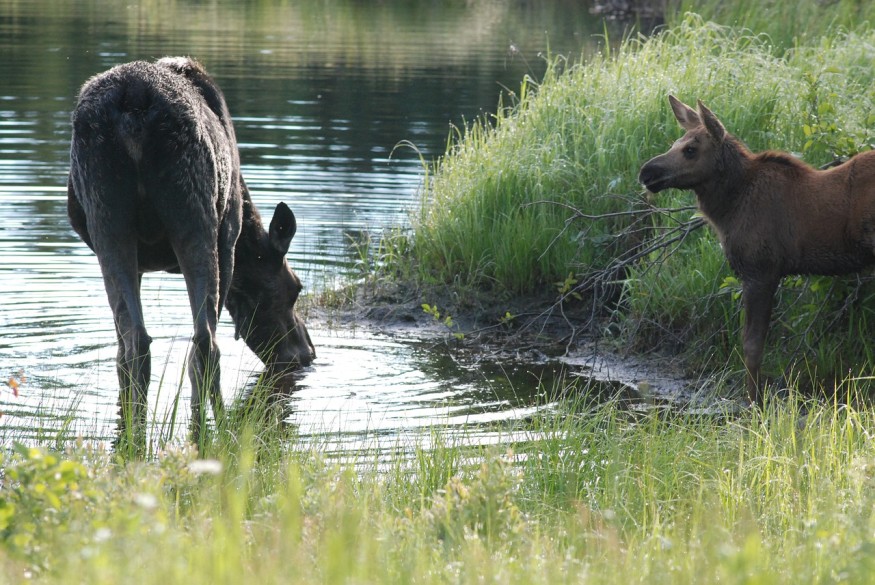Mothers in the animal kingdom are just like human moms who are fierce and protective of their young, perhaps even stronger and braver. They are biologically programmed to preserve their species by protecting their offspring, with some even going to incredible lengths to do so.
An example of animal maternal instinct displayed in the wild is the recent viral video of a mother moose chasing down a hungry grizzly bear after it ate one of its two newborn calves. Read on to learn further details.

Mother Moose Chases Grizzly Bear
The incident happened in Montana and was captured in a video by onlookers. People have taken out their smartphones to capture nature in action as the mother moose chase down the grizzly bear to the road and into the water USA Today's FTW Outdoors reported.
The footage shared on social media did not provide any content or explanation of how the predation of at least one of the two calves of the moose by the hungry grizzly bear started. However, other clips have revealed bits and pieces of the story from the point of view of onlookers at the Many Glacier Hotel in Glacier National Park.
One video shows the bear attacking one of the calves while the mother moose was standing in the lake. Joshua Camareno, an employee at the property, told FTW Outdoors that the ordeal of the moose family began last Friday, May 27, and lasted until Sunday evening, May 29.
Camareno said that the grizzly bear first took one of the calves into the woods after attacking it Saturday and then tried to come back for the second calf after a few hours. That was when the mother moose had enough and decided to chase him off. On Sunday evening, National Park Service rangers have used a hazing technique to scare the mother moose and her remaining calf into the woods.
"I've seen the grizzly come back twice since then, looking for it," Camareno told FTW Outdoors late Monday.
@hightowerbuilders Part 2 Grizzly tries to kill moose calf number 2 and mamma moose chases it off and bear breaks glass window at many glacier hotel #glaciernationalpark #gnp #grizzly ♬ original sound - HightowerBuilders
@hightowerbuilders Part 2 Grizzly tries to kill moose calf number 2 and mamma moose chases it off and bear breaks glass window at many glacier hotel #glaciernationalpark #gnp #grizzly ♬ original sound - HightowerBuilders
Grizzly bears are omnivores and usually eat fleshy roots, fruits, berries, grasses and forbs. However, when they are on the hunt, just like what is shown in the videos, they go for fish, rodents like a ground squirrel, carrion and hoofed animals like moose, elk, caribou and deer, according to The National Wildlife Federation.
Leave Baby Moose Alone
Palmer Fish and Game biologist Todd Rinaldi said in an article in Frontiersman that moose calving season in Mat-Su Valley typically begins in mid-May. Moose breed in the fall and have a gestation period of 231 days and leave their calf on their own.
However, that does not mean that other animals or humans can go near them. A moose calf alone does not always mean they are orphaned or abandoned, says Alaska Division of Wildlife Conservation assistant director Tony Kavalok.
He reminds people to stay away from the moose calf and try to keep their pets close by during the calving season as mother moose could be aggressive, as seen in the recent viral video clips online.
Humans should give moose a wide space and never assume that a calf was abandoned since leaving them alone is quite common in their species. Mother moose will often leave their offspring for several hours as they forage for food, and that is the time when people see the young moose on their own.
If a baby moose has been on its own for a day or two, people can contact Fish and Game biologists. However, the best thing to do is let nature take its course. Calves have a much larger chance of surviving if they are with their mothers.
Here's another video of a mother moose protecting its young from a wolf:
Check out more news and information on Animals in Science Times.
© 2025 ScienceTimes.com All rights reserved. Do not reproduce without permission. The window to the world of Science Times.










